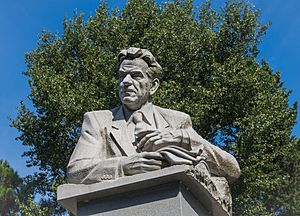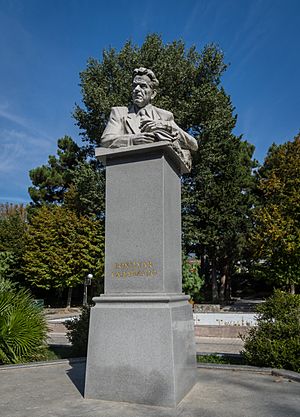Bakhtiyar Vahabzadeh facts for kids
Quick facts for kids
Bakhtiyar Vahabzadeh
|
|
|---|---|
| Born | August 16, 1925 Nukha |
| Died | February 13, 2009 (aged 83) Baku |
Bakhtiyar Vahabzadeh (Azerbaijani: Bəxtiyar Vahabzadə; August 16, 1925 – February 13, 2009) was a famous Azerbaijani poet, writer, and translator. He was also a college professor and a politician. Many people think he was one of the greatest poets in Azerbaijan in his time.
Contents
Life Story
Bakhtiyar Vahabzadeh was born in 1925 in a city called Nukha. Today, you can see a statue of him in a main square there. In 1934, his family moved to Baku. He later studied a subject called philology at Azerbaijan State University. Philology is the study of language and literature.
He worked as a professor at the university until 1990. For a short time, from 1962 to 1964, he was not allowed to teach. This was because his ideas about his country were seen as too strong by the government. He had three children: Gulzar, Isfandiyar, and Azer. His son, Isfandiyar, later became Azerbaijan's ambassador to Moldova.
Vahabzadeh passed away in Baku on February 13, 2009, when he was 83 years old. The President of Azerbaijan attended his memorial service.
Writing Career
In 1951, Vahabzadeh completed his big research paper about the Azerbaijani poet Samad Vurgun. In 1952, he was worried that his poems might get him into trouble. He had written some things that criticized the government at the time. So, he destroyed most of his early poems. He saved only a few by hiding them in his mother's fake leg!
Throughout his career, he wrote about many important topics. These included his home country of Azerbaijan, family, nature, language, and freedom. His articles and poems were often published in a review called Türk Edebiyatı. He became well-known in Turkey for an article called Yel Kaya'dan Ne Aparır? (What Does the Wind Steal from the Stone?).
Vahabzadeh received many awards for his work. In 1974, he won the Azerbaijan SSR state prize. He also won a state award for the entire USSR in 1984. A year later, he was named "People's Poet." In 2002, he received a special medal from the Romanian Ministry of Culture. This was for his poetry book titled Benim Garibim (My Poor).
Poetry and Long Poems
Some of his most famous long poems include Yollar-Oğullar (Roads-Sons). This poem was about the fight for freedom in Algeria. Another poem, Mugam, celebrated Azerbaijan's famous composer Üzeyir Hacıbeyli.
Many of Vahabzadeh's works had a hidden political message. He would seem to criticize problems in other countries. But really, he was talking about similar issues back home in the Soviet Union. For example, in 1967, he wrote Latin Dili (Latin Language). He wrote it after visiting Morocco. He noticed that local people there had to use French, not their native Arabic. This was like how Azeris in the USSR had to use Russian. The poem then talked about Latin, a language still used even though no one speaks it as their first language. This poem almost got him in trouble with the KGB. But he said it was about Morocco, not Azerbaijan.
In a similar way, his 1972 poem Dawn looked at how a scientist in the USA was treated unfairly. But it also quietly showed how people felt watched and worried in the Soviet Union.
Here are some of his other well-known poetic works and collections:
- Menim Dostlarım (My Friends, 1949)
- Bahar (Spring, 1950)
- Dostlug Nağmesi (Book of Friendship, 1953)
- Ebedî Heykel (Eternal Statue, 1954)
- Çınar (Plane Tree, 1956)
- Sade Adamlar (Plain Men, 1956)
- Ceyran (Currency, 1957)
- Aylı Geceler (Nights at Moon, 1958)
- Şairin Kitaphanası (Library of a Poet, 1961)
- E'tiraf (Confession, 1962)
- İnsan ve Zaman (Man and Time, 1964)
- Seçilmiş Eserler (Selected Works, 1967)
- Kökler-Budağlar (Roots and Branches, 1968)
- Deniz-Sahil (Sea-Coast, 1969)
- Bindörtyüzonaltı (Fourteen sixteen, 1970)
- Dam Yeri (On the Roof, 1974)
- Seçilmiş Eserleri (Selected Works, 2 volumes, 1975)
- Yücelikte Tenhalık (Tranquility in Eminence, 1998)
- Benim Garibim (My Strange, 2002)
Plays
His most famous plays include İkinci Ses (The Second Sound, 1991), Yağışdan Sonra (After the Rain), Artığ Adam (Waste Man), and Vicdan (Conscience).
Some of his plays, like İkinci Ses, have been translated into Turkish. Other plays include:
- Feryat (Cry, in verse)
- Nereye Gidiyor Bu Dünya (Where is the World Going, 1991)
- Özümüzü Kesen Kılıç-Göktürkler (The Sword on Our Way-Göktürk tribe, 1998)
- Reqabet
Translations
Vahabzadeh translated Lord Byron's 1813 work Bride of Abydon into Azerbaijani. This work was inspired by Byron's travels in Turkey. Vahabzadeh's own poems have also been translated into many languages. These include other Turkic languages, German, French, and Persian.
Political and University Life
For almost 40 years, from 1951 until he retired in 1990, Vahabzadeh worked at Azerbaijan State University. He was a professor teaching "Contemporary Azerbaijani Literature." In 1980, he became a member of the Azerbaijani Academy of Sciences. He also became a deputy in the Milli Majlis, which is the parliament of Azerbaijan.
He became more important in politics partly by writing works like Leninlə Sohbet in 1976. However, he had always been a strong supporter of his nation. In 1959, he was even kicked out of his university for two years. This happened because he published a poem called Gulustan. In this poem, he talked about how the Azerbaijani people were divided by a treaty signed in 1813.
Vahabzadeh was one of the smart people in Azerbaijan whose words helped increase tensions between Azerbaijani and Armenian groups in 1988. This led to some village changes later on.
He continued his work in parliament even after Azerbaijan became independent. He was elected to Azerbaijan's national parliament in 1995 and again in 2000. On April 15, 1995, he received a very important award called the Istiglal Order. This was for his big help in Azerbaijan's movement to become an independent country. The President of Azerbaijan at that time, Heydar Aliyev, gave him this award.
Today, a major street in Baku is named after Vahabzadeh. A high school in the Turkish city of Adana is also named after him. There are parks named after him in Konya and Ankara. A street in Belgrade, Serbia is also named "Ulica Bahtijara Vagabzade."
 | Lonnie Johnson |
 | Granville Woods |
 | Lewis Howard Latimer |
 | James West |



